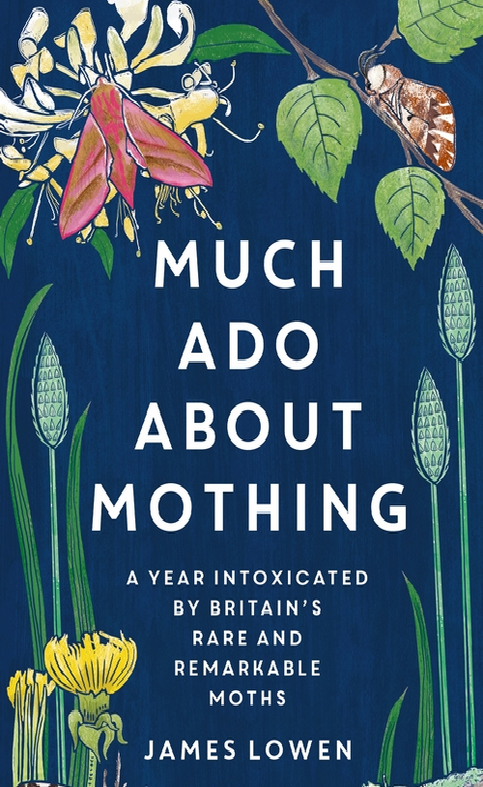
I’m not much of a naturalist, just a half-decent birder and formerly a better than half-decent ornithologist, and so I walk around the natural world missing most things. Birds are easy, even if you don’t look at them they shout, beautifully, at you. Butterflies are great, partly because they are fairly manageable in numbers, but moths? Moths are shady creatures and, as the author of this book once knew, are all tiny and drab. Except, of course, they aren’t, and even the ones that are small and drab are fascinating.
There have been a few books about an author’s quest to see all or a selection of the British [fill in the blank]. Patrick Barkham’s The Butterfly Isles, Jon Dunn’s Orchid Summer, Peter Marren’s Chasing the Ghost and others including, in a fictional form, Kevin Parr’s The Twitch. Hmmm, they all seem to be written by men, containing as they do a slightly competitive edge to them. I like them! The ‘quest’ is a pretty good way to organise a series of encounters with nature in some sort of order with a narrative grip. But the success depends almost entirely, it seems to me, on the author’s ability to enthuse the reader as he succeeds in finding some species and perhaps fails with others.
This book’s quest, is a very good read. I didn’t really mind the fact that some of these moths meant very little to me because it was the quest that mattered, and above all the engaging nature of the writing carried me through lots of moth names. The quest clearly mattered to the author, and James Lowen quickly got me on his side and I wanted him to see every moth in the book and to have a great time doing it.
Of course, we learn a lot about moths along the way and about the way that our land use has influenced the fate of moths. Seeing the world from a moth’s perspective is an experience.
And the author takes us to interesting sites across Britain, and to habitats as diverse as wetlands and the Brecks, Dorset heaths and ancient woodlands. We meet some interesting and admirable characters too – some historical, and some still alive and kicking.
The jaunts in search of moths are punctuated by the author’s own mothing in his garden with his daughter. These interludes allow a change of pace, a change of perspective and a change of species. They were some of the most enjoyable parts of the book. And the book is highly enjoyable.
I think I’ll save moths for when I can’t go birding any more – but that doesn’t prevent me from liking this enthusiastic account of the author’s quest. I’m very glad that many people, the author included, are fascinated by moths. I don’t have to be fascinated by moths to empathise with their enthusiasm, and wish both them and their moths well. It is just possible that moth-ers are in many ways, nicer and less shallow than we birders. Discuss!
A great title for a book of this sort and a very attractive cover too (7/10).
Much Ado About Mothing: a year intoxicated by Britain’s rare and remarkable moths by James Lowen is published by Bloomsbury (on 27 May).
[registration_form]
“It is just possible that moth-ers are in many ways, nicer and less shallow than we birders. Discuss!”
Many birders are moth-ers and vice versa! Whatever their interests, people vary and some are inevitably nicer than others but I think that if someone loves nature then they are already off to a good start!
It is virtually impossible to be an expert on every taxonomic group so inevitably we all tend to end up specialising to some extent on those groups that happen to take our fancy. It is not necessary, though, to be able to identify everything we encounter to species level in order to appreciate the wonderful diversity and complexity of nature. The lovely sunny days we are currently enjoying are a fantastic opportunity to get on our hands and knees and experience the myriad small creatures that share our gardens with us (and the birds)!
Jonathan – I agree. See the quote from Nobel Prize winning physicist Richard Feynman in Fighting for Birds on p31 about the irrelevance of putting a name to things.
I’ll probably read may even buy this as a birder who “does moths”– butterflies, orchids, bees, fish, mammals, dragons and damselflies, bees, amphibs and reptiles, other plants. I’d like to be good at mosses, fungi and lichen too but sadly they keep defeating me and I’m not that great at bees either.
My Methodist grandfather told a joke which was regarded as racy in those days about a budding entomologist who started to read a book entitled “Advice to young mothers” and couldn’t understand a word of it.
Mark’s review is encouraging.
This book is clearly one to be added to the others mentioned above, which cover a wide range of Natural History.
So I think I’ll ask for it for my 82nd birthday next month (although It’s now much trickier getting British books sent to Sweden, and I don’t want to use Amazon)
Bookshop.org may be of interest as an alternative to Amazon. Not sure of the logistics of sending to Sweden though. It supports independent bookshops.
I notice that an author can become an affiliate and get some monetary reward for reviewing books – may interest you Mark?